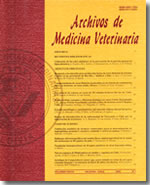Recurrent airway obstruction in horses
Main Article Content
Abstract
Recurrent airway obstruction (RAO) is an inflammatory process caused by hypersensitivity due to inhalation of alergen agents, the process is characterized by inflammation of airways, mucus hypersecretion and obstruction. The onset of the disease is triggered by the surrounding where horses are stabled; often abundant organic dust of the hay, straw of bed, dust of the atmosphere, microorganisms contained in airway of the animals and the material of construction of the stable are important predisponent causes of RAO. The symtoms are due to airways inflammation caused by an type I hipersensitivity reaction in first moment, with the consecuent release of histamine and other pro-imflamatory agents, followed by a hipersensitivity reaction type III based on immune complex formation in situ with complement activation, and production of chemioatractants for neutrophils. This imflamatory process induces in other resident cells the activation of many genes using the NF-kB as common trancripcional factor. The diagnosis method for this alergic process is the broncheoalveolar lavage (BAL) followed by cytologic examination. In the case of RAO positive horses, the citology of BAL is characterized by a significant increase of neutrophils and in smaller percentage of eosinophils and mast cells. Administration of glucocorticoids sytemically or by inhalation, reduces the inflammation and obstruction of airways. The bronchodilators drugs also can be used to alleviate respiratory distress. The present work reviews the associated factors involved, the predisponent, the inmmunologic and molecular mechanisms associate to the disease, as well as diagnosis and treatment.

